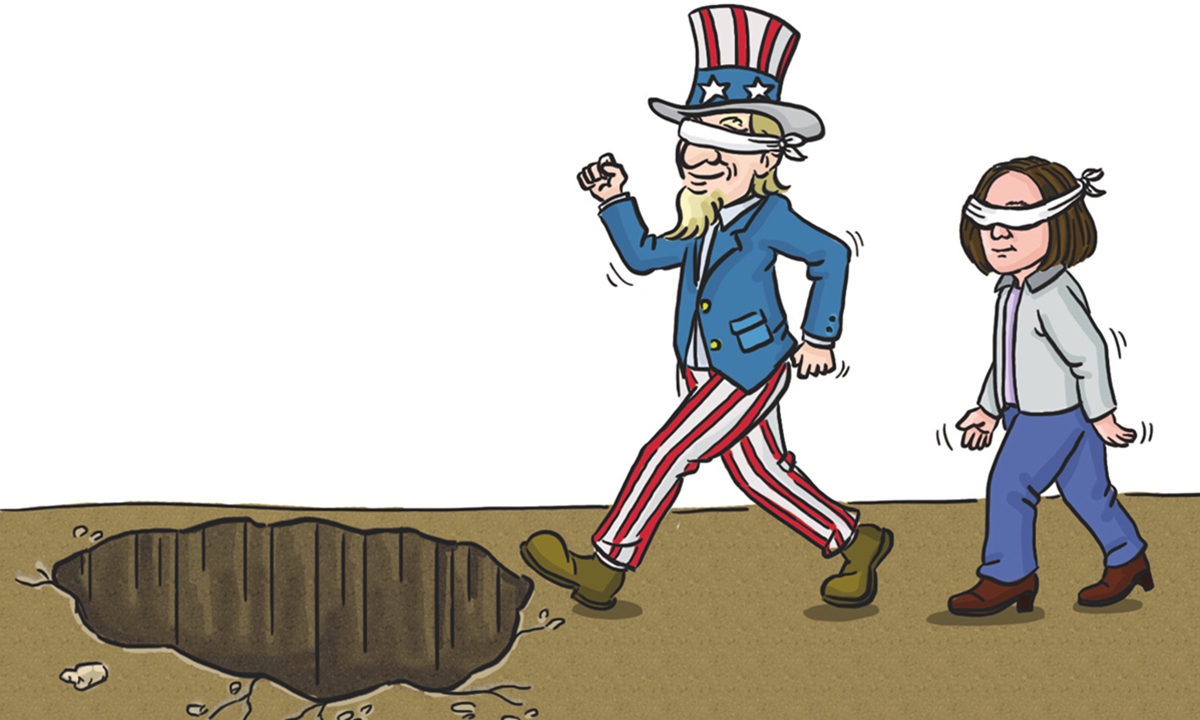US, Taiwan play tricks, but futile strategically: Global Times editorial
Source: Global Times Published: 2020/11/23 21:46:55

Illustration: Xia Qing/GT
The US and the island of Taiwan have repeatedly made new collusive moves. It was reported a US military aircraft on Sunday arrived at Taipei's Songshan airport. Taiwan authorities denied a media report that the head of the Central Intelligence Agency had visited the island. But they did not confirm whether the visiting US official was Rear Admiral Michael Studeman, director for intelligence of the US Indo-Pacific Command. Furthermore, the head of the US Environmental Protection Agency Andrew Wheeler will reportedly visit the island in early December, the third visit by a senior US official since August.
The US has ramped up its collusion with Taiwan. One of the aims of the Trump administration and authorities of Taiwan regional leader Tsai Ing-wen is to set the tone or shape the Taiwan policy for the incoming administration of Joe Biden. Trump has less than two months in his term. How bold would the US and Taiwan be to perform the "final madness"?
First, the US and Taiwan intend to upgrade their bilateral ties, which is their set plan. They will constantly squeeze the Chinese mainland's bottom line. From the view of Washington, its aim is not only to boost its relations with the island, but also to exploit it as a leverage to pile more pressure on Beijing.
On the other hand, the US and the island of Taiwan are increasingly afraid that the Chinese mainland would resort to military means to counter Taiwan separatist moves in accordance with the Anti-Secession Law. The Chinese mainland's air force and navy have normalized their flight and navigation around the island. Fighter jets of the Chinese mainland have crossed the "median line" of the Taiwan Straits multiple times. Fighter jets of the Chinese mainland flying over the island may take place at any time. The Chinese mainland's military drills are no longer merely a warning, but a combat exercise. All these have produced actual deterrence. Neither the US nor Taiwan can afford to take it lightly.
Various information about the Taiwan Straits seems confusing, but the decisive pattern is getting clearer - the mainland has an absolute military advantage over Taiwan, as well as a strong and credible anti-access/area denial capability against the US. On the surface, the US and Taiwan are quite proactive in playing small tricks, but strategically, the mainland holds the initiative on whether to take military action against Taiwan, and what penalties to take.
Taiwan authorities have resorted to various tricks of Taiwan secessionism. However, the mainland can calmly assess how those words and deeds will harm the international community's consensus on the one-China principle. The mainland can also calculate and compare the different costs between making up for such harm and directly eradicating the source of Taiwan secessionism. We will not only reunify Taiwan, but also continue to achieve China's development. We are choosing the best way to balance the two goals.
The mainland has regarded the reunification of Taiwan as one of the country's fundamental goals. Cross-Straits relations have gone through ups and downs over the past decades. But looking back, Taiwan has played a role of promoting the mainland's opening-up and its rapid development. Taiwan has also motivated the mainland's military development. Today, the mainland has the unprecedented ability to dominate the situation in the Taiwan Straits. We should be more confident about the future.
The US shows its teeth and claws around the world, but is forced to exercise restraint in the Taiwan Straits. There are subtle differences in the US' actions in the South China Sea with those in the Taiwan Straits. The US has no moral excuse and cannot be sure of its military advantage over the mainland on the Taiwan question. From a long-term perspective, the political atmosphere in the Taiwan island is not stable. As such, on one hand, Washington has offered support to the current Taiwan authorities, but on the other, US actions have been restrained by various factors.
The US and Taiwan island only dare to use "salami tactics" while eagerly awaiting the mainland's response. They hope to gain petty advantages to boost the image of the Trump administration and Taiwan authorities, but dare not provoke the mainland too much.
Imagine, if mainland fighter jets fly over the island of Taiwan and we include "airspace" of the island into the patrol scope of the PLA. What a shock it will be. If frictions erupt between the PLA and the Taiwan troops, and the PLA gives a good lesson to the latter, what else can Washington do except launching protects or sanctions?
Finally, we want to advise the US and Taiwan island: The Taiwan Straits are a very special place, and only acting with caution is in line with your interests.
Posted in: EDITORIAL